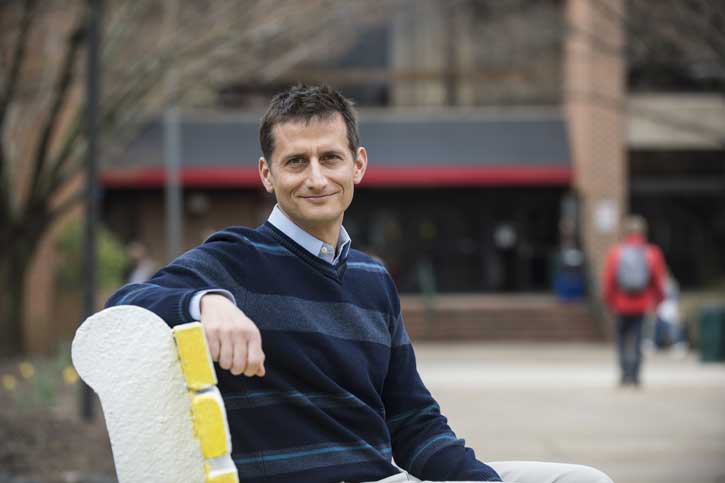
Eric McGlinchey has a three-year grant to study the erosion of U.S. influence in Central Asia. Photo by Ron Aira.
The collapse of the Soviet Union afforded the nations of Central Asia a chance to shift their political allegiance and cultural mores to those modeled by their former enemy, the United States.
“Many Central Asians saw the U.S. as a refreshing alternative to their enduring Soviet hangover,” said Eric McGlinchey, who made his first visit to the region in 1995. “The U.S. promised an alternative: Hollywood, Michael Jackson and President Clinton, who loved burgers and democracy in equal measure.”
Two decades later, after both Democratic and Republican administrations, McGlinchey, a professor of politics at George Mason University’s Schar School of Policy and Government, suspects the United States is no longer seen as favorably in the energy-rich and geographically strategic nations of Kazakhstan, Uzbekistan, Turkmenistan, Tajikistan and Kyrgyzstan.
Now he has a $1.5 million grant from the Department of Defense’s Minerva Research Initiative to study for three years what he believes might be “a major erosion” in Central Asia’s perception of the United States.
“There’s less enthusiasm for policies abroad, less enthusiasm for democracy as modeled by the U.S., less enthusiasm for the presence of the U.S.,” he said.
McGlinchey and his co-principal investigator, Marlene Laruelle, director of the Central Asia Program at George Washington University, are applying social science methods to survey attitudes toward America and the West from 1993 to the present “to see where we are and to see how things have changed over time,” he said.
The study will examine, among other aspects, the apparent erosion of America’s “soft power” in the region. Soft power is the ability of admired governments or leaders to shape the preferences of other states and leaders, he said.
“Arguably, the peaceable collapse of the Soviet Union was not the result of the arms race but rather the result of the Soviet leaders conceding in the face of mounting protests. They could not deliver the wealth and freedoms that Americans and Western Europeans enjoyed.”
Wielding influence in the region is important, McGlinchey said. China is the dominant economic force; Russia looms as the major political influencer; Islamist messaging is also having an impact, which he said leaves the United States with little clout.
Any conclusions McGlinchey and Laruelle reach will be useful to many who make policy decisions regarding Central Asia, he said. Besides the Department of Defense and other U.S. agencies, nongovernmental organizations operating in the region might use the information to overcome challenges.
For example, an American nongovernmental organization working on human rights issues in the region might encounter resistance because of the United States’ liberal LGBTQ policies. Because of the loss of respect for American values by Central Asians, the human rights workers would have to overcome the perception of undermining the local culture.
“And understanding these things could also help Western European powers,” McGlinchey added.
